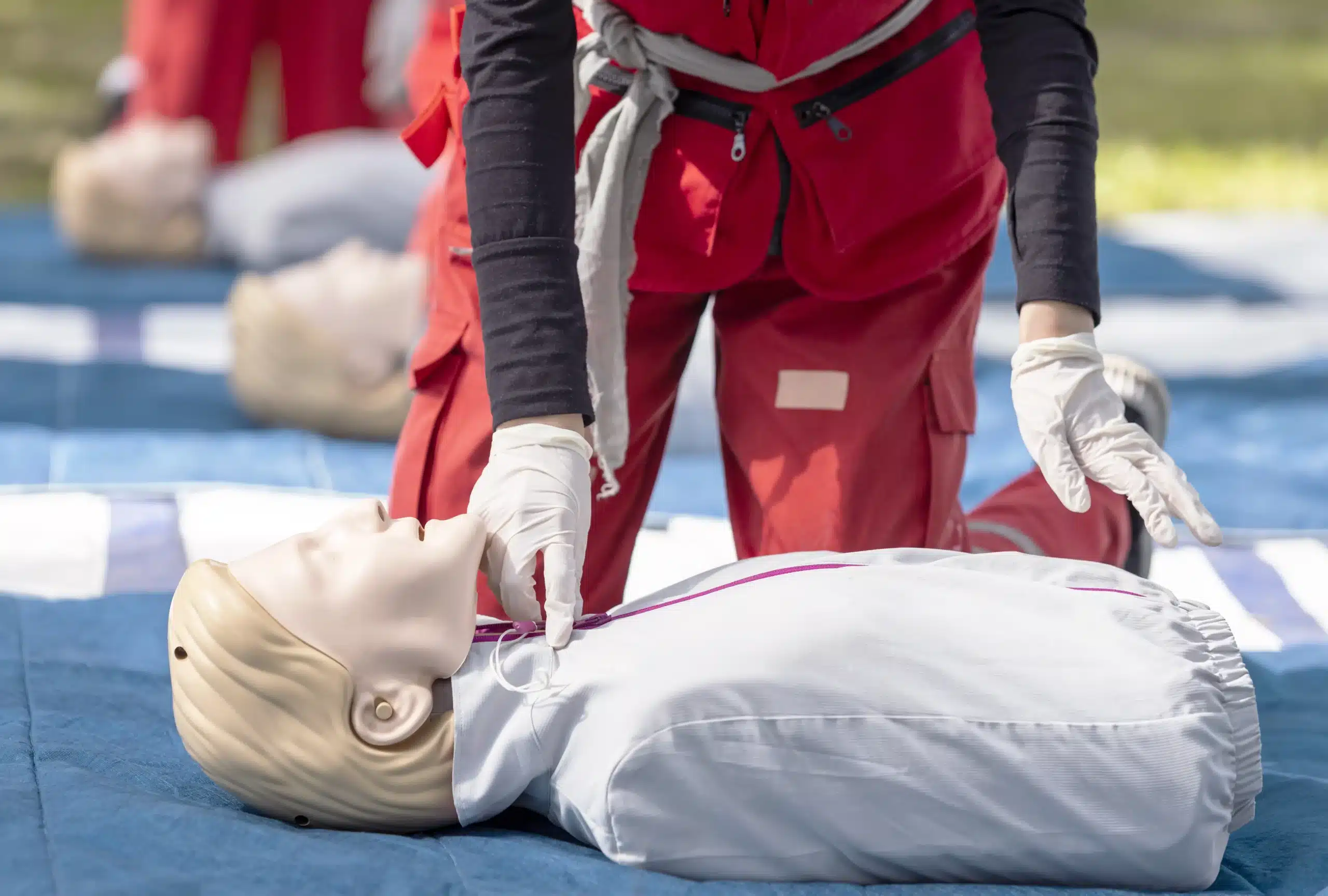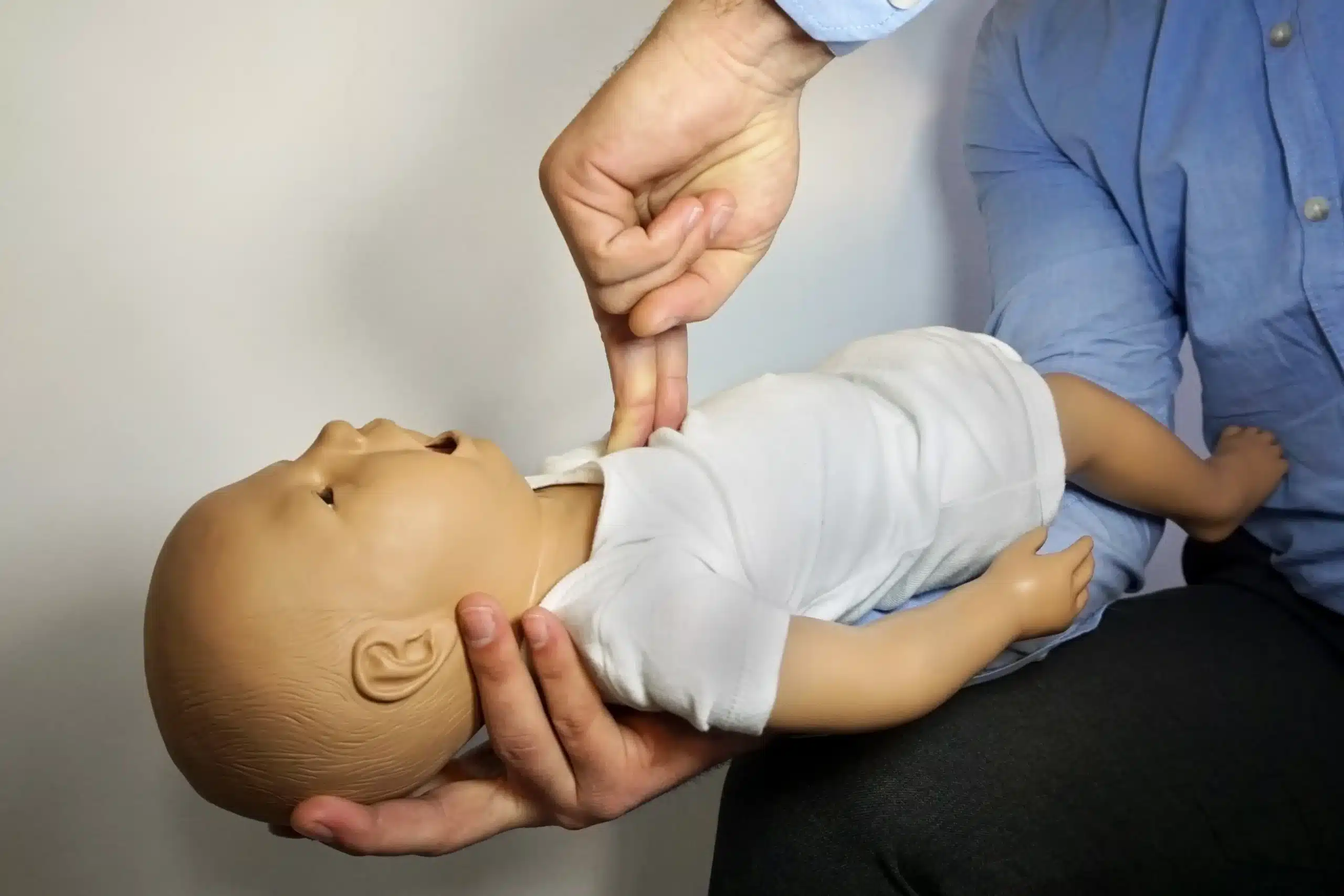Are you a healthcare provider in Dublin seeking a more effective way to maintain your CPR skills? Traditional CPR recertification can be time-consuming and often leads to skill decay between renewals. Resuscitation Quality Improvement (RQI) offers a game-changing solution with its “low-dose, high-frequency” approach. RQI in Dublin empowers healthcare professionals like you with short, frequent practice sessions that fit seamlessly into your busy schedule. This innovative program ensures your CPR skills remain sharp, boosting your confidence and ultimately improving patient outcomes. Join us as we explore how RQI is transforming CPR training in Dublin and how you can benefit from this dynamic approach.
Key Takeaways
- RQI transforms CPR training: Frequent, short practice sessions improve skill retention and boost provider confidence, unlike traditional infrequent courses.
- RQI leads to better patient care: Improved CPR skills directly translate to improved patient outcomes in Dublin.
- Successful RQI implementation requires planning: Address potential challenges like IT integration and policy adjustments to maximize program effectiveness.
What is RQI? Revolutionizing CPR Training in Dublin
The Resuscitation Quality Improvement (RQI) program is changing how healthcare professionals in Dublin approach CPR training. This innovative program improves the quality and consistency of Basic Life Support (BLS) skills. RQI uses a “low-dose, high-frequency” learning model, meaning short, frequent practice sessions replace traditional, lengthy recertification courses. This approach helps healthcare providers maintain their skills and confidence in providing high-quality CPR. Laerdal Medical offers valuable insights into how RQI helps organizations achieve their BLS quality and compliance objectives, using training aligned with the Resuscitation Council UK guidelines. The program, anchored in the American Heart Association’s science, is offered through a partnership with the Irish Heart Foundation, making it readily available to healthcare professionals throughout Ireland. The American Heart Association also provides a helpful overview of RQI, explaining how it improves CPR skills confidence and performance. RQI isn’t just another training program; it’s a comprehensive system for maintaining CPR competency, ultimately leading to better patient care.
How RQI Transforms CPR Training
RQI, or Resuscitation Quality Improvement, represents a significant shift in how healthcare professionals learn and maintain CPR skills. It moves away from traditional, infrequent training sessions and embraces a more dynamic and effective approach. This methodology focuses on three key elements: low-dose, high-frequency learning, self-directed training, and regular skills assessment. These components work together to create a continuous learning experience that builds confidence and competence in CPR.
Low-Dose, High-Frequency Learning
Traditional CPR training often involves lengthy, infrequent sessions that can be difficult to fit into busy schedules. RQI addresses this by incorporating short, frequent refresher sessions. This “low-dose, high-frequency” approach makes it easier for healthcare providers to integrate training into their routines, leading to improved CPR competence. Think bite-sized learning, spread out over time, rather than cramming for a big test. This consistent reinforcement helps solidify skills and knowledge, making them readily available when needed. The Irish Heart Foundation highlights how this method improves CPR competence.
Self-Directed Training
RQI empowers healthcare professionals to take control of their learning through self-directed training. The program uses adaptive eLearning technology that adjusts content and questions based on individual knowledge and confidence levels. This personalized approach ensures learners focus on areas where they need the most practice and reinforcement. The American Heart Association explains how RQI’s self-paced learning adapts to individual needs. This flexibility allows providers to learn at their own speed and convenience, fitting training seamlessly into their schedules. The ability to review real and simulated events as training opportunities further enhances the learning experience.
Regular Skills Assessment
Consistent skills assessment is crucial for maintaining proficiency in CPR. RQI incorporates regular hands-on skills sessions at simulation stations equipped with real-time audiovisual feedback. This objective feedback helps providers refine their technique and ensure they are performing CPR to the highest standards. The American Heart Association details how RQI uses objective feedback to improve CPR quality. This ongoing assessment reinforces proper technique and identifies areas for improvement, promoting continuous growth and development of CPR skills. A study published in the Nursing & Health Sciences Research Journal demonstrated the positive impact of RQI on CPR skills and cost-effectiveness.
RQI Benefits for Dublin Healthcare Professionals
RQI offers numerous advantages for healthcare professionals in Dublin, ultimately leading to better patient care and outcomes. Let’s explore some key benefits:
Enhanced CPR Skills Retention
Traditional CPR training often involves lengthy, infrequent sessions, which can lead to skill decay. RQI addresses this with “low-dose, high-frequency” training. Short, regular practice sessions reinforce essential skills, making them second nature. This approach, based on the American Heart Association’s science and supported by the Irish Heart Foundation, ensures healthcare providers maintain high CPR proficiency. Consistent practice builds confidence and reduces errors during real-life emergencies.
Improved Patient Outcomes
Improved CPR skills directly translate to improved patient outcomes. Studies show the RQI model leads to better CPR performance, including more effective compressions and ventilations. When providers can deliver high-quality CPR quickly and efficiently, patients have a greater chance of survival and positive neurological recovery.
Performance Tracking
RQI incorporates robust performance tracking. The program allows documentation of both real and simulated events as training opportunities, provided participants receive proper assessment and debriefing. This data-driven approach helps identify areas for improvement and ensures consistent skill development across teams. Tracking progress also motivates individuals and fosters a culture of continuous learning.
Increased CPR Confidence
Regular practice and performance feedback through RQI build confidence. Knowing they possess the skills to perform effective CPR empowers providers to act decisively in critical situations. The AHA emphasizes frequent BLS training and ALS retraining for providers likely to encounter cardiac arrest, and RQI provides the ideal platform for this. Increased confidence translates to quicker responses and greater willingness to intervene, improving patient outcomes.
Implement RQI in Dublin Healthcare Organizations
Implementing Resuscitation Quality Improvement (RQI) in Dublin healthcare organizations requires careful planning and execution. This section addresses key considerations for a smooth and successful RQI implementation.
Cost and Budget Considerations
While there are upfront costs associated with RQI implementation, it’s important to consider the long-term financial benefits. Studies have shown that RQI programs can lead to significant cost savings by improving CPR skills and potentially reducing adverse patient outcomes. One study found that the overall improvement in staff CPR skills and the resulting cost avoidance justified the implementation of RQI, even with initial challenges. Think of RQI as an investment in your team and your patients’ well-being. Explore funding options and consider the potential return on investment when budgeting for RQI.
Potential Bulk Training Discounts
Many RQI providers offer discounts for bulk training, making it more affordable to train large groups of healthcare professionals. Check with providers like Laerdal Medical, who offer RQI programs aligned with Resuscitation Council UK (RCUK) guidelines, about potential cost savings for your organization. These discounts can significantly reduce the overall cost of implementation and make RQI more accessible to a wider range of healthcare facilities in Dublin.
Overcome Implementation Challenges
Implementing any new program comes with its own set of challenges. Here’s how to address some common hurdles in RQI implementation:
Lead Successful Implementation
Successful RQI implementation requires strong leadership and a clear plan. Following established guidelines, such as the ILCOR’s 10 steps, can provide a roadmap for improving in-hospital CPR quality and identifying areas for improvement within your organization. A dedicated implementation team can help ensure a smooth transition and address any unforeseen issues.
Address IT Concerns
Integrating RQI technology with existing hospital systems can sometimes present IT challenges. Common issues include user support, software integration with Learning Management Systems (LMS), and data management. Addressing these concerns proactively by involving IT staff early in the planning process can prevent delays and ensure a seamless integration. This research highlights some of the common IT-related challenges encountered during RQI implementation.
Manage Policy Changes
Implementing RQI may require adjustments to existing hospital policies and procedures. Clear communication and collaboration with staff are crucial for managing these changes effectively. Addressing potential barriers related to policy adjustments, data privacy, and security upfront can streamline the implementation process. This article on barriers to quality improvement programs offers insights into navigating these challenges.
Access RQI Training in Dublin
Finding the right RQI training program in Dublin involves understanding the various options available, from local training centers to online platforms. Let’s explore how you can access this life-saving training.
Local Training Centers
The Irish Heart Foundation plays a key role in bringing RQI to Ireland, partnering with the American Heart Association and Laerdal Medical. They offer valuable resources and information on RQI programs and may be able to connect you with local training centers. Check their website for the most up-to-date details on training locations and schedules. Additionally, exploring local hospitals and healthcare facilities can often uncover RQI training opportunities within their professional development programs.
Online Platforms and Resources
The American Heart Association provides a comprehensive overview of the RQI program on their website, including information on its innovative approach to CPR skill maintenance. This is a great starting point to understand the core components of RQI and its benefits. Many RQI providers also offer online platforms and resources that complement in-person training, allowing for flexible and convenient learning.
RQI Providers in Dublin
Several organizations offer RQI training in Dublin or resources to help you find it.
San Ramon CPR Courses
While San Ramon CPR Courses focuses on traditional CPR certification, they may be a valuable resource for related training needs. Visit their website or contact them directly to inquire about potential partnerships or referrals for RQI training in the Dublin area. They also offer a low price guarantee on their courses.
Irish Heart Foundation
As a key partner in bringing RQI to Ireland, the Irish Heart Foundation is a crucial resource. Their website offers information on the RQI program and its implementation in Ireland.
American Heart Association
The American Heart Association provides detailed information about the RQI program, its benefits, and its implementation. Their website is a valuable resource for understanding the program’s core principles and finding certified training centers.
Laerdal Medical
Laerdal Medical, a partner in developing the RQI program, offers information on their website about RQI and its implementation in various healthcare settings. They may also be able to connect you with training providers in your area.
Measure RQI Effectiveness
Tracking the effectiveness of your RQI program is crucial to demonstrate its value and ensure continuous improvement. Here’s how you can measure the impact of RQI training:
CPR Skills Confidence
One of the most immediate effects of RQI training is the increase in provider confidence. Regular practice and personalized feedback through the RQI platform build proficiency and comfort with CPR skills. Studies show that providers who participate in RQI demonstrate improved performance in compressions and ventilation, along with fewer attempts needed to achieve high-quality CPR. This increased confidence translates to more effective responses during real-life emergencies. The American Heart Association highlights these improvements in their RQI program materials.
Compression Rate Adherence
Consistent and correct compression rate is critical for effective CPR. RQI reinforces this skill through frequent practice and real-time feedback. Research indicates a strong correlation between the number of RQI sessions completed and adherence to compression rate guidelines during actual pediatric emergencies. This focus on maintaining proper compression rates can significantly impact patient outcomes. Learn more about the impact of RQI on compression rate adherence.
Chest Compression Fraction Improvement
Chest compression fraction, the proportion of time during a cardiac arrest event spent performing chest compressions, is a key indicator of CPR quality. RQI has been shown to improve chest compression fraction. One study found an increase from 83% pre-RQI to 93% post-RQI implementation during in-hospital cardiac arrest events. This improvement highlights the effectiveness of RQI in optimizing CPR performance and maximizing the chances of a positive outcome. This research on chest compression fraction underscores the value of RQI.
Patient Survival Rates
Ultimately, the goal of any CPR training program is to improve patient survival rates. While many factors influence survival after cardiac arrest, high-quality CPR is undeniably a critical component. RQI’s focus on consistent practice and feedback directly contributes to better CPR skills. The American Heart Association emphasizes that combining real clinical experience with performance assessment and debriefing is key to improving skills, ultimately leading to better rates of return of spontaneous circulation. The AHA’s annotated bibliography offers further insights into the connection between RQI and patient outcomes.
Implement RQI Successfully
Successfully implementing Resuscitation Quality Improvement (RQI) requires a multi-pronged approach. It’s not just about adopting new technology; it’s about fostering a culture of continuous improvement in CPR skills and patient care. Here’s how Dublin healthcare organizations can ensure a smooth and effective RQI implementation:
Enhance User Support and Training
Comprehensive training and ongoing support are crucial for staff to fully embrace and utilize RQI. Think of it like learning any new skill—practice and guidance make all the difference. A structured training program ensures everyone understands the system and feels comfortable using it. Beyond the initial training, continued support and mentorship can address questions, troubleshoot issues, and reinforce best practices. This ongoing support helps build confidence and maintain high-quality CPR skills. As highlighted in research published in the Nursing & Health Sciences Research Journal, inadequate training can hinder CPR skill development, making comprehensive programs and ongoing support essential for healthcare professionals providing CPR.
Improve Data Management and Integration
RQI generates valuable data on CPR performance. To maximize its potential, you need a robust data management system. This system should track key metrics, identify areas for improvement, and demonstrate the program’s impact. Seamless integration with existing hospital systems simplifies data collection and analysis. Think organized record-keeping and streamlined processes. This data-driven approach allows for informed decision-making and continuous quality improvement, as supported by research on the importance of data management in quality improvement initiatives.
Secure Sustainable Funding
Long-term success with RQI depends on securing sustainable funding. Explore different funding models, including activity-based funding, which can provide a more stable and effective financial structure. This consistent funding stream allows for ongoing training, equipment maintenance, and program updates. This ensures that your RQI program remains effective and up-to-date, as suggested by research on sustainable funding for healthcare programs. Consider this an investment in improving patient outcomes and building a stronger, more resilient healthcare system.
Facilitate Team Communication
Open communication and collaboration are essential for successful RQI implementation. Encourage feedback from staff, address concerns promptly, and celebrate successes. When team members feel heard and valued, they’re more likely to embrace the program and contribute to its success. This collaborative environment fosters a sense of ownership and promotes a culture of continuous improvement in CPR training and patient care. Research emphasizes the importance of effective communication among team members to overcome challenges during RQI implementation and ultimately improve patient care.
Address RQI Implementation Challenges
Successfully integrating Resuscitation Quality Improvement (RQI) into your Dublin healthcare organization requires careful planning and execution. While RQI offers significant advantages, some common hurdles can arise during implementation. Proactively addressing these challenges will pave the way for a smoother transition and maximize the program’s benefits.
Improve User Support
One of the first steps to successful RQI implementation is providing robust user support. This includes comprehensive training on the RQI platform and readily available assistance for troubleshooting any technical issues. A dedicated support team or designated RQI champion can address user questions, offer guidance, and ensure everyone feels comfortable using the system. A study by Baptist Health highlighted how limited user support can affect RQI implementation, emphasizing the need for ongoing support and training. Clear communication and accessible resources are crucial for staff buy-in and successful program adoption.
Integrate IT Systems
Seamless integration with existing IT systems is essential for efficient RQI implementation. Compatibility issues between the RQI platform and your organization’s learning management system (LMS) can create workflow disruptions and hinder data collection. Prioritize IT system integration early in the planning process to avoid these roadblocks. The same Baptist Health study identified integration with an institution’s LMS platform as a key challenge. Collaborating with your IT department and the RQI provider will ensure a smooth integration process and minimize potential technical difficulties.
Manage Equipment and Policies
Effective equipment management and clear policies are vital for a successful RQI program. Establish a system for tracking and maintaining RQI equipment, ensuring its availability and functionality. Develop clear policies outlining staff responsibilities, training schedules, and compliance procedures. These policies should address equipment usage, data management, and reporting requirements. The Baptist Health research also emphasized the importance of these factors for successful RQI implementation. Well-defined procedures and readily available equipment contribute to a more efficient and effective training program.
Ensure Compliance Data Accuracy
Accurate data collection and reporting are fundamental to measuring the success of your RQI program. Establish a reliable system for tracking training completion, skills competency, and compliance data. Regularly audit the data to identify any discrepancies and ensure its accuracy. The Baptist Health study noted compliance data discrepancies as a significant barrier to RQI success. Accurate data provides valuable insights into program effectiveness and allows for data-driven decision-making to optimize your RQI implementation.
The Future of RQI in Dublin
RQI is already making waves in Dublin, but its potential goes even further. Here’s a glimpse into what the future might hold:
Integrate Advanced Technology
RQI programs already use technology with automated training and skills assessments. Looking ahead, we can expect even more advanced technology like sophisticated simulations, personalized feedback, and virtual reality training modules. These advancements will create more immersive learning, leading to even higher levels of CPR competence among healthcare professionals. Laerdal Medical discusses how RQI helps organizations meet quality and compliance goals using technology-driven training delivered at the point of care, allowing professionals to refresh their skills in short sessions right at work. This focus on accessible, tech-forward training is key to the future of RQI.
Engage the Community
The future of RQI involves expanding beyond hospitals and engaging the wider Dublin community. Think public awareness campaigns promoting RQI and its benefits, community training programs, and partnerships with local organizations. The Irish Heart Foundation emphasizes the importance of supplementing RQI training with events like mock codes and team training to reinforce skills and teamwork in real-world scenarios. This community focus will empower more people with the skills to respond confidently in medical emergencies.
Expand RQI Applications
While RQI is currently focused on healthcare, its low-dose, high-frequency training can be applied to other fields. Imagine RQI-style programs for first responders, teachers, or even parents. Research in the Nursing & Health Sciences Research Journal highlights the positive impact of RQI, noting that improved CPR skills and cost savings justified the program’s expansion across a hospital system despite initial challenges. This suggests RQI is adaptable and suitable for more people in Dublin, potentially equipping them with life-saving skills.
Get Started with RQI: Next Steps for Dublin Healthcare Professionals
As healthcare professionals in Dublin, enhancing your CPR skills is crucial for providing top-tier patient care. The Resuscitation Quality Improvement (RQI) program offers a practical and efficient way to do just that. RQI focuses on “low-dose, high-frequency” training, meaning you’ll engage in short, regular refresher sessions that easily fit into your busy schedule. This approach helps maintain your CPR competence and ensures you’re always ready for a cardiac emergency.
So, how can you get started with RQI in Dublin? The Irish Heart Foundation offers this innovative training, tailored for the Irish healthcare market, in collaboration with the American Heart Association and Laerdal Medical. The program helps you achieve and maintain Basic Life Support (BLS) credentials through an automated system that emphasizes hands-on practice and provides real-time feedback. You can explore further details about the RQI program through Laerdal Medical.
Beyond individual RQI training, consider organizing team training events and mock codes within your hospital. These collaborative exercises are invaluable for improving communication and teamwork during real-life emergencies, ultimately leading to better patient care. The Irish Heart Foundation provides helpful FAQs about implementing the RQI program. Taking these steps allows Dublin healthcare professionals to significantly improve patient outcomes and contribute to a higher standard of care across the region.
Related Articles
- RQI Classes in San Ramon, CA – San Ramon CPR Classes
- CPR Training in San Ramon: Your Complete Guide – San Ramon CPR Classes
- San Ramon CPR Certification: Your Guide – San Ramon CPR Classes
- Basic Life Support (BLS) in San Ramon: A Practical Guide – San Ramon CPR Classes
- Why CPR is Important in Healthcare – San Ramon CPR Classes
Frequently Asked Questions
How does RQI differ from traditional CPR training? RQI replaces long, infrequent recertification courses with short, regular practice sessions using simulation stations and personalized online learning. This “low-dose, high-frequency” approach makes it easier to fit training into busy schedules and leads to better skill retention. It also incorporates regular skills assessments with real-time feedback to help refine technique.
What are the key components of RQI training? RQI training focuses on three main elements: low-dose, high-frequency learning, self-directed training, and regular skills assessment. These elements work together to create a continuous learning experience that builds confidence and competence in CPR. The self-directed aspect allows healthcare providers to learn at their own pace and focus on areas where they need the most practice.
Where can I access RQI training in Dublin? The Irish Heart Foundation is a primary resource for finding RQI training in Dublin. They partner with the American Heart Association and Laerdal Medical to offer the program. You can also check with local hospitals and healthcare facilities, as many offer RQI training as part of their professional development programs. Some providers offer online resources and platforms to supplement in-person training.
How can RQI benefit my healthcare organization? RQI can lead to improved CPR skills retention, better patient outcomes, increased staff confidence in performing CPR, and more efficient performance tracking. It can also result in cost savings in the long run by reducing the need for lengthy recertification courses and potentially improving patient outcomes.
How can I measure the effectiveness of an RQI program? You can track several metrics to measure RQI’s effectiveness, including CPR skills confidence, adherence to compression rate guidelines, chest compression fraction improvement, and ultimately, patient survival rates. Regularly monitoring these metrics helps demonstrate the program’s value and identify areas for ongoing improvement.






